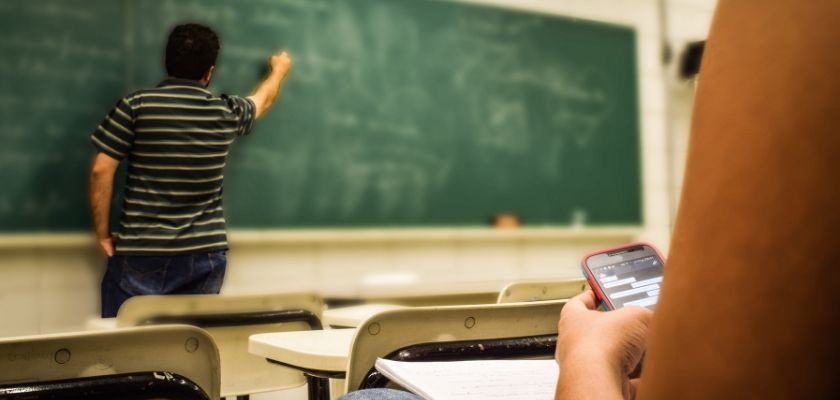The level of digital surveillance in schools across the United States increased exponentially in just a couple of years. Allegedly, the surveillance methods are implemented to predict violent behavior through the screening of student’s data exchanges on social networks and other platforms and alerting competent authorities when needed.
However, the downsides of digital surveillance proved to surpass by far the benefits in many aspects of our society, and education does not seem to make an exception. Just a few cases of suspected violence have been prevented at the cost of total disregard for the privacy of students, parents, and adults.
Thousands of false positives are generated mostly by decontextualized triggers or by simple manifestations of adolescence.
A company called Social Sentinel was recently hired by the local Brazosport Independent School District to monitor public posts from users on various social networks. During the first eight months of this school year, Social Sentinel sent almost 140 alerts to Brazosport officials including the district’s superintendent, chief of police, and director of student services – reported Education Week.
Among the “threats” signaled by Social Sentinel:
A post about a cat owner ‘talking’ to his cats containing the words “I would die for you.”
https://twitter.com/AmandaLafrenais/status/1074191458914263041
Some Tweets about the movie “Shooter.”
A “shooting clinic” by the Stephen F. Austin State University women’s basketball team and a fan, pleased that their credit score was “shooting up.”
A common Facebook quiz posted by a local vape shop.
An anti-abortion tweet that contained the words “endorses murder.”
Social media monitoring involves everyone living in areas surrounding schools, including adults. In some cases, companies access to the private digital content of millions of students using devices provided by the districts running with apps implemented with tip-reporting, face-recognition, and other surveillance technologies.
The push towards total digital surveillance comes in the wake of shocking events such as February 2018’s Marjory Stoneman Douglas High School shooting. Similarly to post-9/11, there is an understandable instinct to do whatever is possible to stop the next horrible thing from happening, explained Rachel Levinson-Waldman – a lawyer with the liberty and national security program at the Brennan Center for Justice. “But the solution doesn’t solve the problem, and it creates new issues of its own,” she said.
According to Gary Margolis – CEO of Social Sentinel – any harm pales in comparison to the benefits of surveillance. He also emphasized Social Sentinel’s work on issues like suicide and self-harm.
Another company, the Illinois based Gaggle, monitors the digital content created daily by almost 5 million U.S. K-12 students, including files, messages, and class assignments. Its algorithms automatically scan all the information looking for keywords and clues that might indicate something bad could happen, escalating the most serious alerts to human employees who decide whether to inform principals.
It is possible – at least in theory – to opt-out from these monitoring practices. But doing so would make student life extremely impractical in many U.S. schools.
According to Gaggle’s CEO Jeff Patterson, it is just the way the world works now.
“Privacy went out the window in the last five years,” he said. “We’re a part of that. For the good of society, for protecting kids.”
Earlier this year Gaggle released a report presenting the results of the period between June and December 2018. The report said a total of 5,100 incidents “required immediate attention for imminent and serious issues,” out of which 577 involved imminent danger.
But interviews with the administrators of the district involved and documents obtained by Gaggle’s K-12 clients paint a different picture.
Take Grand Rapids 17,000 students school district for example, where last December a local 15-year-old-student was arrested and then expelled for posting threatening messages – jokes, according to him– on Snapchat.
It was just one of nearly 3,000 cases flagged by Gaggle between August and February of this school year in Grand Rapid schools, according to a dashboard summary provided by the district.
Over 2,500 of these cases were minor violations involving obscenity.
Almost 40 students were flagged for potential suicide or self-harm, usually for storing files – including school essays- containing words such as “hate myself”, “hurt myself”, “end my life”.
More than two dozen students were flagged for sending or storing offensive or pornographic content.
At least a dozen students were flagged for storing or sending content including the word “gay”.
Students storing files with creative names including the words “shit”, “pussy”, and “bastard” were also flagged.
Evergreen Public Schools in Washington State started using Gaggle’s services this school year. Between September and mid-March, the system flagged more than 9,000 incidents in the 26,000-student district.
The vast majority – an overwhelming 84% – were minor violations, with all the characteristics of teenage-hood, including fights, profanity, nudity and bong rips.
The ACLU exposed what considers to be the threats of school surveillance in a March blog post: chilling students’ intellectual freedom and free-speech rights, undermining their reasonable expectations of privacy, traumatizing children with false accusations, and systematically desensitizing a generation of kids to pervasive surveillance.
Free Tutorial: Our step-by-step guide to starting your own website for fun or profit













